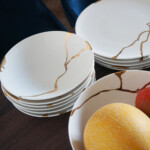Beschreibung des Produkts
Für unsere Kintsugi-Porzellan-Kollektion haben wir mit der europäischen Porzellanmanufaktur Karolina zusammengearbeitet, deren Geschichte bis ins Jahr 1860 zurückreicht, um Ihnen ein Produkt zu bieten, das das Ergebnis jahrelanger Erfahrung ist. Unser gesamtes Porzellan wird von Hand dekoriert und auf seine Qualität geprüft, so dass jedes Stück ein Unikat ist. Ein Kintsugi-Muster aus 24-karätigem Gold wird von Hand auf das fein gearbeitete, tierversuchsfreie Fine Bone China (FBC)-Porzellan aufgebracht, um eine zeitgemäße Interpretation des alten Japan zu schaffen.
Über die Kunst des Kintsugi

Die japanische Kunst des Kintsugi lehrt, dass zerbrochene Gegenstände, insbesondere Porzellan, nicht versteckt, sondern mit Stolz zur Schau gestellt werden sollten, und daran wollten wir alle erinnern. Wenn eine Schale, eine Teekanne oder eine kostbare Vase herunterfällt und in tausend Stücke zerbricht, werfen wir sie wütend und mit Bedauern weg. Doch es gibt eine Alternative, eine japanische Praxis, bei der die Bruchstellen hervorgehoben und aufgewertet werden, wodurch das zerbrochene Objekt an Wert gewinnt. Kintsugi (金継ぎ) oder Kintsukuroi (金繕い), wörtlich Gold (“kin”) und Reparatur (“tsugi”), ist eine traditionelle japanische Kunst, bei der ein Edelmetall – flüssiges Gold, flüssiges Silber oder mit Goldpulver bestäubter Lack – verwendet wird, um die Scherben eines zerbrochenen Töpferwarenstücks wieder zusammenzufügen und gleichzeitig die Bruchstellen aufzuwerten. Die Technik besteht darin, Porzellanfragmente zusammenzufügen und ihnen ein neues, raffinierteres Aussehen zu verleihen. Jedes reparierte Stück ist ein Unikat, da die Keramik zufällig zerbricht und unregelmäßige Muster entstehen, die durch die Verwendung von Metallen verstärkt werden. Bei der Gestaltung der Kintsugi Collection haben wir uns von dieser alten japanischen Kunst der Keramikreparatur inspirieren lassen. Durch das Reparieren zerbrochener Keramik war es möglich, der Keramik ein neues Leben zu geben, das durch ihre “Narben” noch raffinierter werden konnte.
Über unser Fine Bone China-Porzellan
Fine Bone China (FBC)-Porzellanprodukte zeichnen sich durch einen cremefarbenen Ton und eine hohe Transluzenz aus. Diese Eigenschaften ergeben sich aus den Brennbedingungen und der Zusammensetzung der Masse. Die Geschirrkollektion von Oishya Home wird aus tierversuchsfreiem Fine Bone China, also New Fine Bone China, hergestellt. Für diese Kollektion haben wir mit einem europäischen Porzellanhersteller zusammengearbeitet, der die spezielle Technik zur Herstellung von elfenbeinfarbenem Porzellan mit hoher Lichtdurchlässigkeit, dem sogenannten Fine Bone China, perfektioniert hat. Unser Geschirr wird aus hochwertigen importierten Rohstoffen hergestellt, darunter Kaoline (48%), Quarz (20%) und Feldspat (30%). Der Hersteller verfügt über gültige Qualitätszertifikate der Lieferanten für alle in der Produktion verwendeten Rohstoffe. Darüber hinaus werden die Rohstoffe im Werkslabor auf der Grundlage der Normen BN, PN und ZN geprüft, bevor sie in die Produktion gelangen.









































